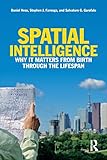Spatial intelligence : why it matters from birth through the lifespan / Daniel Ness, Stephen J. Farenga, and Salvatore G. Garofalo.
Material type: TextPublication details: New York : Routledge, ©2017.Description: xiii, 273 pages : illustrations, maps ; 23 cmISBN:
TextPublication details: New York : Routledge, ©2017.Description: xiii, 273 pages : illustrations, maps ; 23 cmISBN: - 9781138850859
- 153.752 23 N463
| Item type | Current library | Call number | Status | Date due | Barcode | Item holds | |
|---|---|---|---|---|---|---|---|
| Books | ISI Library, Kolkata | 153.752 N463 (Browse shelf(Opens below)) | Available | 138371 |
Includes bibliographical references and index.
1. The spatial [thinking] definition : a time-honored enigma --
2. Developing a sense of space --
3. Alternative spatial thinking models --
4. From g to [infinity] : spatial ability--the primal intelligence --
5. "You are here" : mapping space --
6. Redefining affordance to maximize spatial intelligence --
7. Making space : bows, brushes, and plaster --
8. Free space : spatial thinking in the curriculum --
9. Technospace : from atoms to bits --
10. Humane space.
Spatial Intelligence examines public and professional conceptions of the relationships between thinking about spatial attributes and active engagement in spatially related constructions and designs. Even though children’s and adolescents’ spatial propensities in constructive activities parallel the skills needed by professionals in both established and emerging fields, spatial education is often missing from K–12 curricula and is easily impeded by teachers, parents, or other individuals who do not provide contexts in formalized settings, such as schools, to nurture its potential. This book bridges the gap by linking the natural spatial inclinations, interests, and proclivities of individuals from a variety of cultures with professional training and expertise in engineering, architecture, science, and mathematics. Educators will be better able to achieve the skills and awareness necessary to provide children and young adults with the vital opportunities inherent in spatial education.
There are no comments on this title.



























